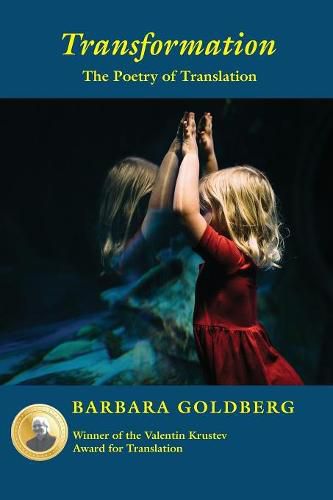Readings Newsletter
Become a Readings Member to make your shopping experience even easier.
Sign in or sign up for free!
You’re not far away from qualifying for FREE standard shipping within Australia
You’ve qualified for FREE standard shipping within Australia
The cart is loading…






This title is printed to order. This book may have been self-published. If so, we cannot guarantee the quality of the content. In the main most books will have gone through the editing process however some may not. We therefore suggest that you be aware of this before ordering this book. If in doubt check either the author or publisher’s details as we are unable to accept any returns unless they are faulty. Please contact us if you have any questions.
Introduction by MYRA SKALREW
Languages are living organisms, according to George Steiner. Barbara
Goldberg, in Transformation, comes into her true landscape as she moves
between languages, exploring the evolution of her restless and profound
journey. At long last, she can call on her multiple resources–poetry and
prose, humor and tragedy, life in this century cast in the shadow of 19th
Century Vienna. The hidden memories of loved ones. Even the dead
who can’t keep a secret.
Languages–French, English, German, Hebrew. The divergent syntax of
each. All the while, Fear is the ravenous wolf at my door. Sometimes I
throw him a scrap, in the shape of a poem. None of this prevents her from
tackling these translations– as satisfying to create as an original (well, a lot
of the time!). We go from Rilke’s Saltimbanques in French to Israeli
poems in Hebrew, including from Iraq, to her long shared life and work with
Moshe Dor. The collection includes interviews and Barbara Goldberg’s work
as International Editor for the Word Work Series including poetry from the
Kurdish, Ancient Greek, the French of Jean Cocteau, and
Spanish/Mexican.
As I write this I am drawn back to Walter Benjamin and George Steiner, as
if a pure language…like a hidden spring seeking to force its way through
the silted channels of our differing tongues will emerge. Transformation is a
powerful element in that journey, worthy of our attention.
[Note: After Babel: Aspects of Langua
$9.00 standard shipping within Australia
FREE standard shipping within Australia for orders over $100.00
Express & International shipping calculated at checkout
This title is printed to order. This book may have been self-published. If so, we cannot guarantee the quality of the content. In the main most books will have gone through the editing process however some may not. We therefore suggest that you be aware of this before ordering this book. If in doubt check either the author or publisher’s details as we are unable to accept any returns unless they are faulty. Please contact us if you have any questions.
Introduction by MYRA SKALREW
Languages are living organisms, according to George Steiner. Barbara
Goldberg, in Transformation, comes into her true landscape as she moves
between languages, exploring the evolution of her restless and profound
journey. At long last, she can call on her multiple resources–poetry and
prose, humor and tragedy, life in this century cast in the shadow of 19th
Century Vienna. The hidden memories of loved ones. Even the dead
who can’t keep a secret.
Languages–French, English, German, Hebrew. The divergent syntax of
each. All the while, Fear is the ravenous wolf at my door. Sometimes I
throw him a scrap, in the shape of a poem. None of this prevents her from
tackling these translations– as satisfying to create as an original (well, a lot
of the time!). We go from Rilke’s Saltimbanques in French to Israeli
poems in Hebrew, including from Iraq, to her long shared life and work with
Moshe Dor. The collection includes interviews and Barbara Goldberg’s work
as International Editor for the Word Work Series including poetry from the
Kurdish, Ancient Greek, the French of Jean Cocteau, and
Spanish/Mexican.
As I write this I am drawn back to Walter Benjamin and George Steiner, as
if a pure language…like a hidden spring seeking to force its way through
the silted channels of our differing tongues will emerge. Transformation is a
powerful element in that journey, worthy of our attention.
[Note: After Babel: Aspects of Langua